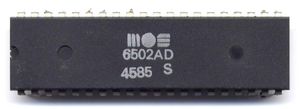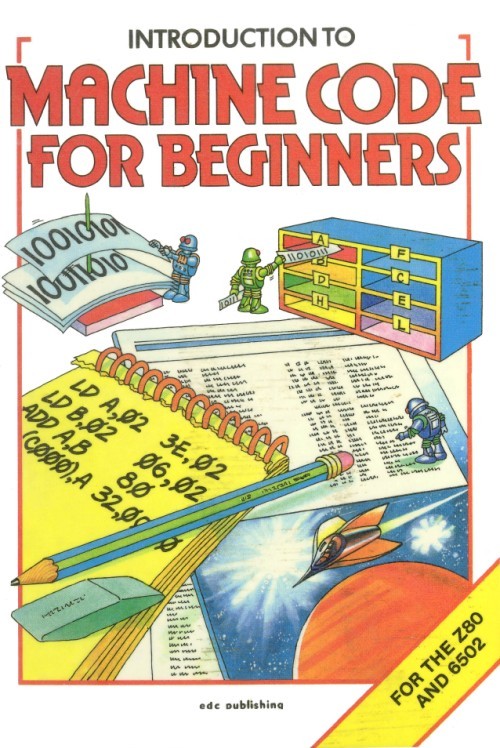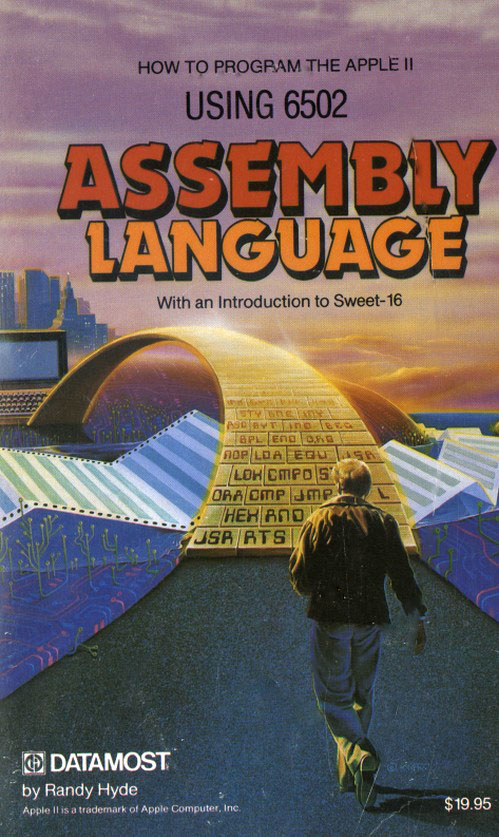The 6502 CPU, from MOS Technology, has been widely used since its debut in 1975. Designed by a group of people at MOS Technology led by Chuck Peddle, later of Commodore fame, and used in machines like the PET and C64. Also quickly adapted by computer designers like Steve Wozniak in the Apple series, the 1 and ][ and 2 and 2e and 2c and 3. And many others followed!
My collection of 65XX ICs is here.
For more 6502 IC photos: look at the cpu-collection page.
For an introduction to the 6502 family go to this wikipedia page.
An introduction on the 6502 programming can be found in this wikibook on 6502 assembly.
The 6502 turned out to be an affordable, yet powerful CPU, easy to interface and easy to understand. Many single board computers were designed with the 6502, most often becoming the heart of largely expanded systems.
The KIM-1, developed by MOS technology as a design example, became such a hit. Many were sold, not only to the original target audience, but also to hobbyists and electronic engineers and system integrators. A new industry was born, based on the microprocessor as the heart of electronic devices. And also the birth of the personal computer, the Apple 2.Nowadays the 6502 is not much more than a memory for most. But the 6502 core is still found in many embedded applications, as sold by the Western Design Centre.
Books in pdf format for download to get started, more books here
- 6501
- 65XX IC’s
- 65XX Datasheets
- MCS6530 and MCS6532
- 6502 Microprocessor Kit
- Atari 850 interface: 6507 + 2 6532
- Andrew Jacobs 6502 pages
- Apple 1 replica’s
- Ben Eater 6502 computer
- Beta Computer SBC
- Cepac-65
- Corsham projects
- KIM-1 products
- KIM Clone
- Corsham SD card system
- SS-30 SS-50 boards
- SS-30 bus extender
- SS-30 Parallel Board
- SS-30 Prototype board
- SS-30 Serial Board
- SS-30 SS-50 technical notes
- SS-30 USB Serial Board
- SS-50 1MB RAM board
- SS-50 64K RAM board
- SS-50 65C02 CPU Board
- SS-50 6800 CPU Board
- SS-50 6809 CPU board
- SS-50 Motherboard
- SS-50 Prototyping board
- SS-50 RAM EEPROM
- SS-50 software SBUG SWTBUG
- Corsham github
- SYM AIM 60K RAM board
- Data Handler
- Datac 1000, a TIM 6502 SBC
- DOS/65
- DOS65
- DOS65 manuals, sources, listings
- DOS65 articles in the KIM 6502 uP Kenner and CompUser
- DOS65 hardware
- Silicon hard disk Andrew Gregory
- EP: EPROM programmer for DOS65
- EPROM programmer Andrew Gregory
- DOS65, floppy emulator HxC2001, transfer files
- DOS65 floppy collection
- DOS65 programming languages
- DOS65 application: ASTRID and Viditel
- DOS65 application: Logic analyzer
- Elektor Elektuur Junior
- Junior Elektor, from base to full system
- Elektor Junior Articles and Books
- Elektor PCB paperware and ESS services
- Alternative Junior Monitor
- Elektor Junior software
- CPM-65 and Elekterminal emulator
- DIY Build a Junior
- Elektor gallery
- Musicprint kit and cassette interface
- Junior retronics articles
- Elektor 6502 clock
- Elektor Universal Terminal
- Elektor EC65
- ESCO 6502 SBC
- EMUF and MC
- KGN COMAL
- Focal-65 V3D for TIM and KIM-1
- L.J. Technical Systems: EMMA DIGIAC
- Jolt and Super Jolt
- John Bell Engineering SBC’s
- KIM-1
- Me and my first KIM-1
- My KIM-1 collection
- The story of the KIM-1
- KIM-1 manuals and MOS Technology documents
- KIM-1 ROMs
- KIM System Products
- Books for the 6502: KIM-1 and more
- Johnson McShane brochures
- MOS Technology KIM-1 Brochures and Newsletters
- The Rockwell KIM-1
- KIM-1 articles
- Compumart KIM-1 Rev A
- Dungeons And Dragons Dice Simulator For The KIM-1
- KIM-1 PCB Edge connectors
- KIM-1 Ziptape
- KIM-100
- ASCII parallel keyboard to KIM-1
- Cassette read and write indicator
- KIM-1 printer output RS232 H14
- Make MS Basic KB9 faster: the ROR bug
- PLL Test
- Reading tapes from other KIM-1
- Recording programs with the KIM-1 and the cassette recorder
- Tape copy
- Suppress KIM-1 echo
- KIM-1 and 6502 in magazines
- KIM-1 revisions images
- KIM-1 revisions, what changed?
- Transistors in the KIM-1
- Amazing it works!
- Hardware expansions
- KIM-1 projects by Eduardo Casino
- KIM-1 Software
- KIM-1 PAL-1 KIM Clone KIM MicroKIM Reproduction resources
- Load papertape format
- KIM-1 emulators
- KIM-1 Simulator
- PC utilities KIM Simulator Convert hex etc
- KIM-1 first clones
- The KIM-1 clones
- KIM-1 videos
- KIM-1 6530 Replacements
- KIM-1 Diagnostic board
- KIM-1 keyboard repair
- MAE ASSM/TED CW Moser
- Kowalski assembler simulator
- Lee Davison’s website
- Enhanced 6502 BASIC
- Some code bits
- Some very short code bits
- SIN and COS calculator
- 6502 ROM file system
- Microchess
- SYM-1 BASIC – more nostalgia
- A 6502 single board computer
- ACIA 6551
- Nop generator
- IDE bus interface circuit
- An expandable 6502 SBC
- AT keyboard interface
- I2C Bus interface
- LazyPROM
- Memory Plus: memory for your KIM SYM AIM
- Mitsubishi 740 boards
- LAB-VOLT 6502
- MDT 650 MOS Technology
- Microsoft Basic 6502
- MCS Alpha 1
- MPS-65 CT-65 CT-6502 Thaler
- Micro Technology Unlimited
- MTU history: Hal Chamberlin
- MTU Catalogs, Product Descriptions and Newsletters
- MTU Application notes
- MTU K-1000 power unit
- MTU K-1002 Audio D/A Converter
- MTU K-1005 Card File and Motherboard using KIM/MTU bus
- MTU K-1007 PET MTU bus interface
- MTU K-1008 Visable Memory
- MTU K-1009-1C AIM 65 Printer Enhancement Package
- K-1012 PROM expansion board
- K-1013 floppy controller
- MTU CODOS
- MTU K-1016 16K RAM board
- MTU K-1020 Prototyping board
- MTU K-1032 Banker RAM ROM I/O
- MTU-130 and MTU-140
- MTU-130 in MAME
- MTU and Eduardo Casino
- MTU Commodore PET products
- My 6502 systems
- OUP/M – A 6502 CP/M Operating system
- OSI 300 Trainer
- Proton PC-1
- PROMAX MI-650 Trainer
- Rockwell AIM 65 and RM65
- AIM 65
- My AIM 65s
- AIM 65 magazines
- AIM 65/40
- RSC-Forth R56F11 R6501Q
- RM 65
- SPS Software Preparation System
- The Sorbus computers
- Synertek SYM-1 KTM
- My Synertek collection photos
- SYM-1
- SYM-1 Manuals and Ref cards
- SYM-1 Monitor
- SYM-1 Pascal and Forth
- 2532 to 2732 EPROM adapter
- SYM-Physis The SYM-1 Users’ Group newsletter
- SYM-1 Basic
- Symtool
- SYM-1 MOD-68 MOD-69
- SYM-1 1541 DOS
- SYM-1 6502 mini and Maxi SBC
- PicoSYM, a SYM-1 emulator on a Raspberry Pico
- SYMulator a SYM-1 emulator
- C, Basic, RAE on the SYM-1
- SYM-2
- KTM-3
- KTM-2 & KTM_2/80
- Synertek MDT 1000
- TM76 Burr Brown 6502 terminal
- TOuCHE
- Three Chips Plus Unilab



